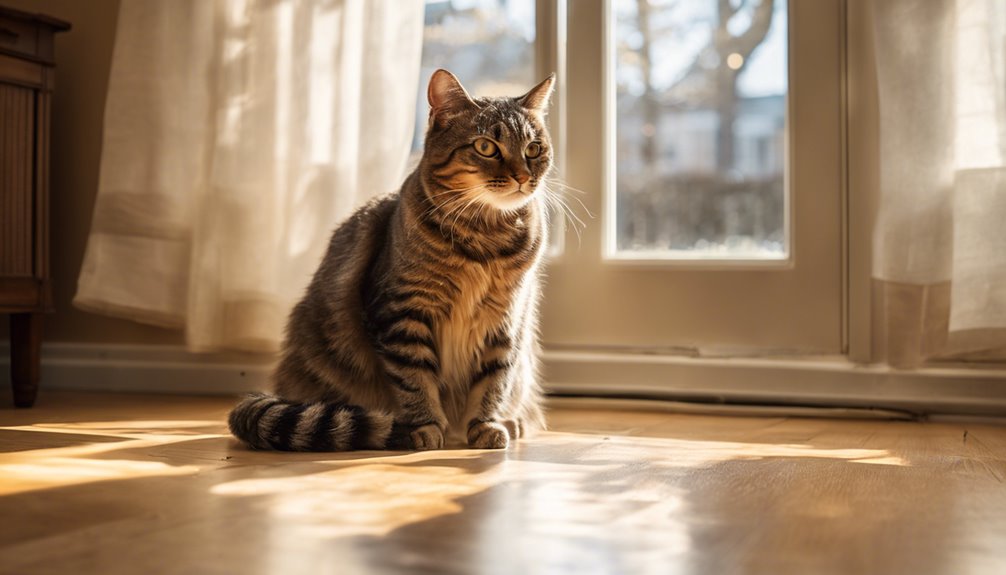If your cat's pooping on the floor, it could stem from several factors. Health issues, like parasites or urinary tract infections, may lead to discomfort that makes litter box use painful. Environmental factors also play a role; dirty or poorly located litter boxes can deter your cat. Stress or anxiety from changes in routine or new pets might contribute, too. Finally, aging cats may have mobility issues that prevent them from reaching the box. Understanding these factors can help; consider exploring deeper insights to effectively address this challenging behavior in your feline friend.
Common Health Issues
When your cat suddenly starts pooping on the floor, it could be a signal of underlying health issues that you shouldn't ignore. Common parasites, such as roundworms or giardia, can disrupt your cat's digestive system, leading to inappropriate elimination. These parasites often cause diarrhea or discomfort, prompting your cat to seek relief in unconventional places. Additionally, urinary infections may also contribute to this behavior. If your cat experiences pain while urinating, it might associate the litter box with discomfort and choose to eliminate elsewhere. Monitoring your cat's habits and seeking veterinary advice is essential. Addressing these health issues not only restores your cat's well-being but also guarantees a harmonious living environment for both of you.
Litter Box Problems
Health issues can certainly play a role in your cat's decision to poop on the floor, but litter box problems often compound the situation. Ensuring proper litter box maintenance and placement is vital for your cat's comfort. Here are some common issues you might encounter:
- Inadequate number of boxes: Ideally, you should have one box per cat, plus one extra.
- Poor litter choice: Cats can be sensitive to textures and scents, so experiment to find what they prefer.
- Dirty boxes: Regular cleaning is essential; a dirty box can deter your cat from using it.
- Placement issues: Boxes should be in quiet, accessible areas, away from food and water.
Addressing these factors can greatly reduce the chances of your cat pooping on the floor.
Behavioral Stressors
Although many cat owners might not immediately consider behavioral stressors, these factors can greatly influence your cat's bathroom habits. Cats are sensitive creatures, and social isolation can lead to increased anxiety triggers. If your cat feels lonely or neglected, it may resort to inappropriate elimination as a means of expressing discomfort. Changes in routine, conflicts with other pets, or even loud noises can exacerbate these feelings, pushing your cat to seek out alternative places to relieve itself. Understanding your cat's emotional state is essential; by addressing potential stressors, you can create a more secure environment. Providing companionship, engaging in play, and minimizing disruptions can help alleviate anxiety and restore your cat's trust in its surroundings.
Environmental Changes
When you make changes in your cat's environment, such as introducing a new litter type or relocating the litter box, it can greatly impact their bathroom habits. Additionally, household stress factors like new pets or renovations can heighten anxiety, prompting undesirable behaviors like pooping on the floor. Understanding these environmental changes is essential for addressing and preventing this issue effectively.
New Litter Type
As cat owners increasingly seek eco-friendly alternatives, the introduction of new litter types has changed the landscape of feline hygiene products. These innovative litters often offer numerous new litter benefits, appealing to both cats and their humans. The litter texture can vary greatly, impacting your cat's comfort and willingness to use the box.
Consider the following advantages of these new options:
- Biodegradable materials: Reduces your environmental footprint.
- Low dust: Minimizes respiratory issues for both you and your cat.
- Odor control: Keeps your home smelling fresh.
- Absorbency: Enhances comfort and performance.
Change in Location
Changes in your cat's environment, such as a move to a new home or alterations in room layout, can greatly impact their behavior and habits, including where they choose to relieve themselves. When faced with a location change, your cat may struggle to adapt to unfamiliar surroundings, leading to confusion about their litter box. Environmental adaptation is essential for their comfort; if they feel insecure in their new space, they might resort to pooping on the floor as a way to express stress or disorientation. Ensuring that their litter box is easily accessible and located in a quiet, familiar area can help facilitate this shift. By understanding these dynamics, you can better support your cat's adjustment and encourage appropriate elimination behaviors.
Household Stress Factors
Household stress factors, such as the introduction of new pets or considerable disruptions in daily routines, can considerably affect your cat's behavior, particularly their bathroom habits. These changes often create anxiety, leading to undesirable outcomes like pooping on the floor. Effective stress management is essential for maintaining household harmony.
To help ease your cat's stress, consider these strategies:
- Maintain a consistent routine to provide stability.
- Introduce new pets gradually, ensuring a smooth shift.
- Create quiet spaces where your cat can retreat and feel safe.
- Monitor interactions to prevent conflicts and establish boundaries.
Territorial Marking
When a cat feels its territory is threatened, it may resort to pooping on the floor as a form of marking. This behavior is rooted in their strong territorial instincts. By leaving feces in specific areas, cats release pheromones that signal their presence to other animals, fundamentally claiming the space as their own. Scent marking through feces is a way for them to assert dominance or communicate discomfort with changes in their environment. If you've recently introduced new pets or even rearranged furniture, your cat might feel insecure and respond by marking. Understanding this instinctual behavior can help you address the underlying issues, ultimately allowing your feline friend to feel more secure and connected within their territory.
Aging and Mobility Issues
As cats age, they often experience mobility issues that can greatly impact their litter box habits. Aging cats may struggle to access their litter boxes due to various mobility challenges, leading to accidents on the floor. To better understand these issues, consider the following factors:
- Decreased flexibility and joint pain
- Reduced strength and stamina
- Cognitive decline affecting decision-making
- Changes in bathroom habits due to discomfort
When you notice your elderly cat pooping on the floor, it's vital to evaluate their environment. Making adjustments, like providing easily accessible litter boxes, can notably improve their quality of life and help prevent accidents. Understanding these mobility challenges can enhance your bond with your aging feline companion.
Dietary Factors
When considering why your cat might be pooping on the floor, dietary factors often play a vital role. An inadequate nutritional balance can lead to gastrointestinal distress, while food allergies and sensitivities may further exacerbate the issue. Addressing these dietary concerns is essential for promoting your cat's overall health and preventing unwanted behaviors.
Inadequate Nutritional Balance
A balanced diet is essential for your cat's overall health, and deficiencies in essential nutrients can lead to problematic behaviors, including inappropriate elimination. When you notice changes in your cat's litter box habits, it's imperative to evaluate their diet for potential nutritional deficiencies. Consider making diet adjustments to restore balance and improve their behavior. Here are some key factors to check:
- Quality of protein sources
- Adequate fiber content
- Essential fatty acids
- Necessary vitamins and minerals
Food Allergies and Sensitivities
Food allergies and sensitivities can be significant contributors to your cat's inappropriate elimination habits. If your cat experiences food intolerance, it may lead to digestive upset, causing discomfort that prompts them to eliminate outside the litter box. Common allergens include grains, dairy, and certain proteins. When your cat's immune system reacts to these substances, it can disrupt their digestive process, resulting in diarrhea or other gastrointestinal issues. Monitoring your cat's diet and identifying potential triggers is essential. A vet can guide you through an elimination diet, helping pinpoint offending ingredients. By addressing food allergies and sensitivities, you can improve your cat's overall well-being and reduce the likelihood of unwanted bathroom incidents around your home.
Psychological Disorders
Although many cat owners may dismiss inappropriate elimination as a mere behavioral issue, psychological disorders can greatly contribute to this problem. Feline anxiety and compulsive behaviors often manifest as litter box avoidance. Understanding these underlying issues is essential for effective intervention.
Consider the following factors:
- Environmental changes: New pets or moving can trigger anxiety.
- Lack of stimulation: Boredom may lead to compulsive behaviors.
- Past trauma: A history of abuse can cause lasting mental stress.
- Health issues: Underlying medical conditions can exacerbate psychological problems.
Frequently Asked Questions
Can Certain Cat Breeds Be More Prone to Litter Box Issues?
You've probably wondered if your cat's breed is a secret agent for litter box chaos. While it sounds absurd, certain breeds do have unique litter box preferences and behaviors. For instance, Siamese cats might demand a specific type of litter, while Maine Coons may prefer a spacious box. Understanding these breed behaviors can help you create a harmonious bathroom environment, reducing those pesky accidents and keeping your feline friend happy and healthy.
How Can I Train My Cat to Stop Pooping on the Floor?
To train your cat to stop pooping on the floor, focus on positive reinforcement and consistent litter box maintenance. Make certain the litter box is clean and placed in a quiet area. When your cat uses the litter box, reward them with treats or praise to reinforce the behavior. If accidents occur, avoid punishment; instead, observe any underlying issues, such as stress or health problems, to address them effectively.
Is It Normal for Cats to Occasionally Poop Outside the Litter Box?
It's not unusual for cats to occasionally poop outside the litter box. However, if this behavior becomes frequent, it might signal underlying health issues. It's crucial to take into account factors like stress, litter box cleanliness, or even the type of litter you're using. Monitoring your cat's habits and consulting with a vet can help guarantee their well-being and address any potential problems before they escalate. Remember, your cat's comfort is key to maintaining good habits.
What Should I Do Immediately After Finding Poop on the Floor?
When you find poop on the floor, it's essential to act quickly. Start by wearing gloves to prevent contamination. Use paper towels to pick up the mess, then dispose of them properly. For cleaning, a mixture of water and vinegar can help eliminate odors. After that, sanitize the area with an appropriate cleaner to prevent lingering scents. These immediate actions and cleaning tips will guarantee your space stays hygienic and odor-free.
Are There Specific Scents That Deter Cats From Pooping in Certain Areas?
Imagine a cat wandering through a garden, avoiding certain flowers due to their scent. Just like that, scent deterrents can influence your feline's behavior. Natural repellents like citrus, vinegar, or essential oils may keep your cat away from specific areas. By using these scents strategically, you can create an environment that discourages unwanted pooping. It's crucial to experiment, as every cat has unique preferences, so find what works best for yours!




